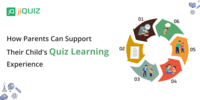- Jul 03, 2025
- Computers
- 448
Share this post on:

In a world increasingly dominated by screens, it’s easy to feel guilty about allowing our children to spend time online. We worry about isolation, cyberbullying, and a detachment from the “real world.” However, the digital landscape isn’t inherently negative. When harnessed thoughtfully, online platforms can foster connection, learning, and even a sense of community. And one surprising way kids are connecting is through online quiz challenges.
Forget the stereotypical image of a child glued to a screen in lonely isolation. Online quiz challenges, when approached correctly, can be powerful tools for building friendships, encouraging teamwork, and sparking a shared sense of excitement – all while reinforcing learning. This blog post will delve into the surprising ways online quiz challenges can bring kids together, exploring the benefits, addressing potential concerns, offering practical examples, and looking at what the future holds for this engaging form of interaction.
The Unexpected Rise of Online Quiz Challenges
Online quizzes have always existed, but the current surge in popularity among children stems from a few key factors. The rise of accessible, user-friendly platforms like Kahoot!, Quizizz, Blooket, and Gimkit (more on these later) has made creating and participating in quizzes incredibly simple. The gamified elements – points, leaderboards, timers, and engaging visuals – tap into children’s natural desire for competition and reward. Moreover, the inherent social aspect, the ability to share results and compete with friends, transforms what could be a solitary activity into a shared experience.
The Benefits: More Than Just Fun and Games
While entertainment value is undeniable, the benefits of online quiz challenges extend far beyond simple amusement.
- Building Social Connections: The most obvious benefit is the opportunity for social interaction. Kids can participate in quizzes with their classmates, friends, family members, or even join online communities centered around shared interests. This shared experience provides a natural conversation starter and a basis for building relationships.
- Teamwork and Collaboration: Many quiz platforms offer team modes, forcing children to communicate and strategize together. This fosters collaboration, problem-solving skills, and the ability to appreciate diverse perspectives – all vital life skills.
- Reinforcing Learning: Quizzes can be powerful learning tools. They provide instant feedback, highlighting areas where children might need extra support. The competitive element can also motivate them to study and review material. The active recall required to answer questions strengthens memory and understanding.
- Boosting Confidence: Success in quizzes, even small victories, can boost a child's confidence and self-esteem. It’s a chance to shine and feel proud of their knowledge and efforts.
- Expanding Interests: Quizzes aren't limited to academic subjects. There are quizzes on everything from Harry Potter to dinosaurs to coding. This allows children to explore new interests and learn about topics they might not otherwise encounter.
- Developing Digital Literacy: Participating in online quizzes encourages children to become more comfortable and competent with digital tools. They learn to navigate online platforms, understand digital etiquette, and develop basic troubleshooting skills.
Popular Platforms and How They Foster Connection
Let’s look at some of the most popular platforms used by kids and how they uniquely contribute to social interaction.
- Kahoot!: Perhaps the most recognizable, Kahoot! is known for its vibrant, fast-paced game format. The live element, where players answer questions simultaneously, creates a sense of excitement and shared experience. Teachers often use Kahoot! in classrooms to review material, and students can easily create and share quizzes with friends.
- Quizizz: Quizizz offers a wider range of game modes, including asynchronous options where students can participate at their own pace. This is beneficial for younger children or those who might feel overwhelmed by the live format. Quizizz also has a strong emphasis on customization, allowing teachers to tailor quizzes to specific learning objectives.
- Blooket: Blooket distinguishes itself with its unique “game modes” which turn the quiz experience into mini-games. These games, such as "Tower of Terror" and "Neon Race," add a layer of fun and unpredictability that keeps kids engaged and fosters friendly competition.
- Gimkit: Gimkit incorporates a virtual economy into the quiz experience, where players earn virtual money for answering questions correctly. They can then use this money to buy upgrades and advantages. This creates a strategic element that encourages teamwork and problem-solving.
Addressing the Concerns: Safety and Moderation
While online quiz challenges offer numerous benefits, it's crucial to address potential concerns and ensure a safe and positive experience for children.
- Cyberbullying: The anonymity afforded by online platforms can, unfortunately, facilitate cyberbullying. Parents and educators need to emphasize the importance of respectful communication and report any instances of harassment.
- Inappropriate Content: While most platforms have content filters, it's still possible for inappropriate material to slip through. Supervision, particularly for younger children, is essential.
- Privacy Concerns: Understanding the platform’s privacy policies and ensuring children are not sharing personal information is paramount.
- Addiction & Screen Time: Like any online activity, excessive screen time can be detrimental. Setting time limits and encouraging balanced activities is crucial.
- Cheating: The competitive nature of quizzes can unfortunately tempt some children to cheat. Discussing academic honesty and the importance of genuine learning is essential.
Practical Tips for Parents and Educators
- Supervision: Especially for younger children, supervise their participation in online quizzes.
- Communication: Talk to your children about online safety, respectful communication, and what to do if they encounter any problems.
- Set Boundaries: Establish clear time limits and ensure a balance between online and offline activities.
- Choose Platforms Carefully: Research the platform’s safety features and privacy policies before allowing your child to participate.
- Encourage Collaboration: Promote teamwork and collaboration by having children create quizzes together or participate in team modes.
- Focus on Learning: Remind children that the goal is to learn and have fun, not just to win.
- Report Inappropriate Behavior: Immediately report any instances of cyberbullying or inappropriate content.
The Future of Online Quiz Challenges: Immersive and Personalized Learning
The evolution of online quiz challenges shows no signs of slowing down. We can expect to see even more innovative features and immersive experiences in the years to come.
- Virtual Reality (VR) and Augmented Reality (AR): Imagine taking a virtual field trip to ancient Rome and then taking a quiz about what you learned! VR and AR technologies have the potential to transform online quizzes into highly engaging and immersive learning experiences.
- Personalized Learning: AI-powered platforms will increasingly tailor quizzes to individual learning styles and needs. This will ensure that each child is challenged appropriately and receives the support they need to succeed.
- Gamification Integration: Expect to see even more sophisticated gamification elements, such as virtual rewards, personalized avatars, and interactive storytelling.
- Increased Social Features: Platforms will likely enhance social features, such as live video chat, collaborative editing tools, and shared virtual spaces.
Online quiz challenges, when approached thoughtfully, can be a powerful force for good, bringing kids together in a fun, engaging, and educational environment. By addressing potential concerns, promoting responsible online behavior, and embracing the innovative features of these platforms, we can harness the potential of technology to foster connection, learning, and a sense of community for children everywhere.





